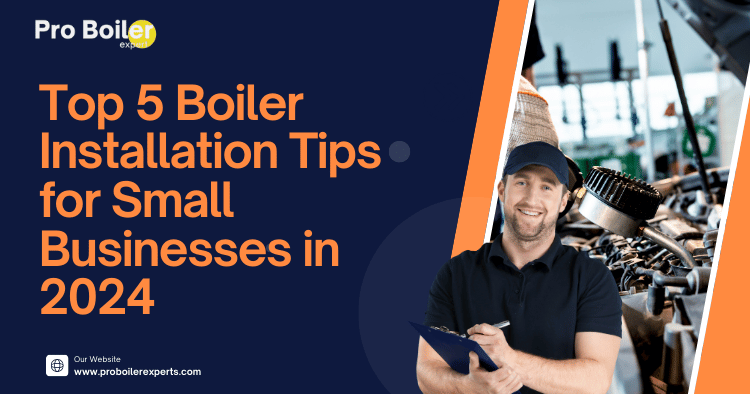Table of Contents
- Understand Your Heating Needs
- Choose the Right Type of Boiler
- Hire Qualified Professionals
- Consider Energy Efficiency
- Plan for Regular Maintenance
Boiler installation is a critical aspect for small businesses, especially as we step into 2024, where energy efficiency and cost-effectiveness are at the forefront of decision-making. A properly installed boiler can keep your workspace comfortable and improve productivity. Here are the top five tips to ensure a smooth installation process.
1. Understand Your Heating Needs
Before diving into the installation process, it’s essential to assess your heating requirements. Ask yourself the following questions:
- What is the size of your business premises? Larger spaces require more heating capacity.
- How many employees do you have? More people in a space can increase the heat generated and affect heating needs.
- What are your operating hours? If your business operates 24/7, you might need a different system compared to a 9-5 operation.
“Assessing your heating needs is the first step towards an efficient boiler installation. Knowing your requirements can save you time and money in the long run.”
FAQ
Q: How can I calculate the required boiler size?
A: You can use a BTU (British Thermal Unit) calculator to estimate the heating needs based on your space. Consult with professionals for precise assessments. Also, consider reading our article on the ultimate boiler size guide for more detailed information.
2. Choose the Right Type of Boiler
Selecting the appropriate boiler type is crucial for efficiency and performance. Here’s a quick overview of common types:
| Boiler Type | Description | Best For |
|---|---|---|
| Combi Boiler | Provides heating and hot water on demand. | Small businesses with limited space. Check out the top benefits of choosing combi boilers for more insights. |
| System Boiler | Requires a cylinder for storing hot water. | Businesses needing high hot water demand. Learn more in our article on system boilers. |
| Regular Boiler | Uses a cold water tank and a hot water cylinder. | Traditional setups with existing systems. Explore the benefits of conventional boilers to understand your options. |
“Choosing the right type of boiler can significantly impact your energy bills and overall comfort. Make sure to evaluate your business’s specific needs before making a decision.”
FAQ
Q: What should I consider when choosing between a combi and a system boiler?
A: Consider your hot water needs and available space. Combi boilers are ideal for smaller spaces, while system boilers are better for higher hot water demand.
3. Hire Qualified Professionals
While it may be tempting to cut costs by opting for inexperienced installers, hiring qualified professionals is essential for safety and efficiency. Look for:
- Gas Safe Registration: Ensure the installer is on the Gas Safe Register (in the UK) or equivalent in your country.
- Experience: Choose professionals with a proven track record in commercial boiler installations. Read more about choosing the right installer in our article on top tips for choosing the right boiler installer.
- Reviews and References: Check online reviews and ask for references to gauge their reliability and service quality.
“Investing in a qualified installer may cost more upfront, but it can prevent costly repairs and safety issues down the line.”
FAQ
Q: How do I find a qualified boiler installer?
A: Websites like Trustpilot or Checkatrade can help you find reputable installers with verified reviews.
4. Consider Energy Efficiency
With energy prices fluctuating, energy efficiency should be at the forefront of your boiler selection. Look for:
- Energy Ratings: Boilers are rated from A to G, with A being the most efficient. An A-rated boiler can save you money on energy bills. Check our guide on the top energy efficiency ratings for your boiler.
- Condensing Boilers: These boilers recover heat from flue gases, making them more efficient. Discover more about condensing boilers in our detailed article.
- Smart Controls: Consider integrating smart thermostats that adapt to your heating needs and can be controlled remotely. Explore the top smart boiler options for energy efficiency in 2024.
“Energy-efficient boilers not only save money but also reduce your business’s carbon footprint. It’s a win-win for both your wallet and the environment.”
FAQ
Q: What is the average lifespan of a boiler?
A: Most boilers last between 10 to 15 years, but regular maintenance can extend their lifespan.
5. Plan for Regular Maintenance
After installation, regular maintenance is key to ensuring your boiler runs efficiently and lasts longer. Here are some tips:
- Schedule Annual Servicing: Have a qualified technician inspect your boiler yearly to catch any potential issues early. For more on maintenance tips, refer to our article on essential boiler maintenance tips.
- Keep Records: Maintain a log of all maintenance work and repairs; this can be useful for warranty claims and resale value.
- Monitor Performance: Pay attention to any changes in heating efficiency or unusual noises, as these can indicate underlying problems.
“Regular maintenance is like a health check-up for your boiler. It keeps your system running smoothly and helps prevent unexpected breakdowns.”
FAQ
Q: What are some signs that my boiler needs maintenance?
A: Look for signs like unusual noises, a drop in water pressure, or fluctuations in temperature. If any of these occur, contact a technician immediately.
By following these top five tips for boiler installation, small businesses can ensure efficient heating, reduce operational costs, and provide a comfortable work environment. For further reading on specific boiler types and their benefits, check out our comprehensive guides on gas boilers, electric boilers, and renewable energy options.
“Happy heating, and here’s to a productive 2024!”





